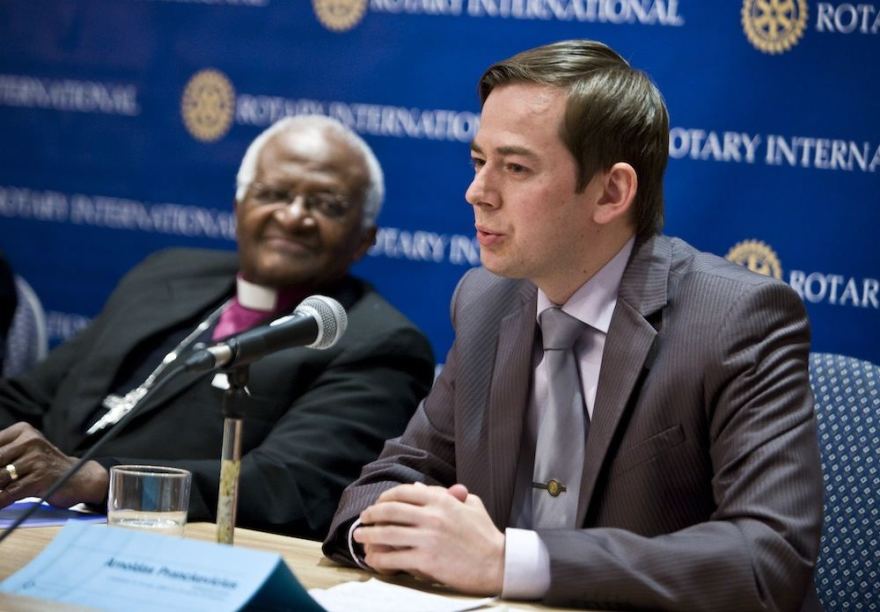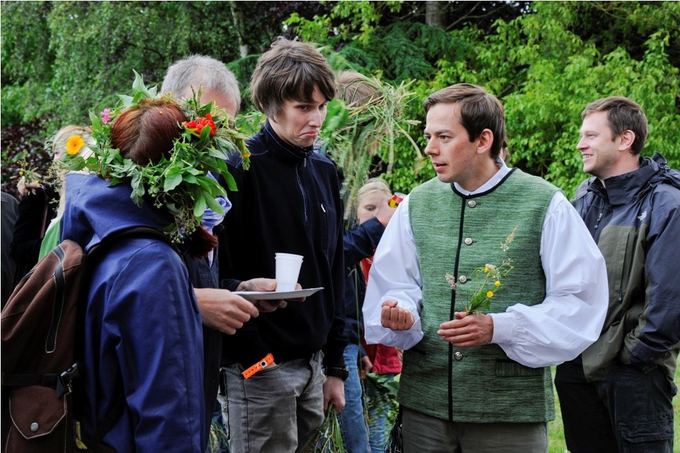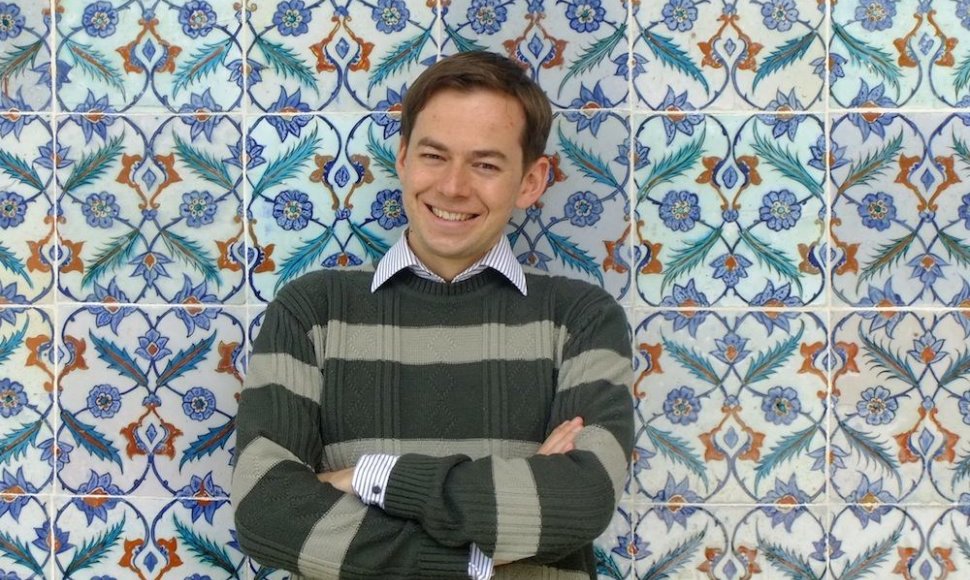Off to Ukraine every other week
Arnoldas' international life began early – still in school, the native of Panevėžys went to New Jersey, USA, for his junior year. He returned home to take graduation exams and do one year in the Institute of Journalism at Vilnius University – and then left again, this time for longer. Finishing undergraduate degree in Colgate University (New York, USA), where he majored in international relations, new experiences, and friends from all around the world did not prevent him from keeping in touch with Lithuania – as a student, Pranckevičius took active part in the expat community and did an internship in the office of Senator Richard Durbin, who himself is of Lithuanian ancestry.
Having spent years in the US, Arnoldas was not inclined to stay and look for a job on the other side of the Atlantic. He did his MA in Paris and in 2004, he returned to Lithuania and became a domestic policy adviser to the then President Valdas Adamkus. But his stay at home only lasted a year and a half – in early 2006, Pranckevičius moved to Brussels and started working in the European Parliament. Three and a half years later, he became an adviser to EP President Jerzy Buzek and continues in the job even after the Polish politician has been replaced in the post by German Martin Schulz.
With the new boss came additional duties. Pranckevičius' responsibilities – relations with EU Eastern Partnership countries, Russia, West Balkans, development strategies – now include Asia. “They gave me an entire continent for dessert – just to keep me from getting bored,” he laughs.
He admits that increased workloads make it harder to attend to his duties as the president of the Belgian Lithuanian Community: “It was hard before, now it is even harder. Schultz is a demanding and strong, very visible political leader, he expects a lot from his team. Working with him is interesting, but it requires much energy. Over the last nine months, I was nearly completely drained by the mission of former prime minister Yulia Tymoshenko's case in Ukraine.
“Community board members were quite annoyed that I was so often away from Brussels, in Kiev every other week. I made twelve trips over six months, nine weeks spent on intense talks with high officials and Tymoshenko.”
As if that were not enough, Arnoldas decided to take up German. “I assisted Buzek without speaking any Polish. It tormented me, he sort of hoped that I would, being a Lithuanian. I threw myself into learning Polish, but I can barely communicate in it now. I did German at school, but it never stuck – I am a fan of Romance languages, except English which is almost a second mother tongue to everyone. I have a sense that the president would like his team to speak German.”
Arnoldas' intense travel schedule made the board of the Lithuanian community exchange their lengthy weekend meetings for quick dinner dates to discuss plans and divide up responsibilities. The community president gives much of the credit to the team for making the Lithuanian community in Brussels work: his deputy Karolina Štelmokaitė, who works as a spokeswoman for Eurocommissioner Algirdas Šemeta, artist Audrius Gražys, two teachers at a European School, a social sciences PhD, and another Lithuanian who works for NATO.
 |
| Asmeninio albumo nuotr./Arnoldas Pranckevičius |
Challenge of uniting Lithuanians
Arnoldas has been part of the Lithuanian community since 2003, when he did an internship in Brussels. It is his fourth year as the community leader, even though before, he had no intention of joining the board. He had been afraid that conferences, meetings, writing speeches, paperwork, and trips abroad would leave little time for anything else.
Urged by his friends, he nevertheless agreed to run for the board – and when he was elected its chair, he was too polite to refuse. Now the Lithuanian community is his refuge from foreign policies – and also his gateway to cultural life, activism and a strong link with Lithuania.
One of his first challenges as the president was to revive the community and help nurture trust among separate Lithuanian groups. There are more than 2 thousand Lithuanians in Belgium – and the number has gone up in the run-up to Lithuania's EU presidency – but the Belgian Lithuanian Community only has some 100 official members, twice as many if you count their families.
The community goes back to 1947, when most Lithuanians came from Germany to work in Belgium's coal mines. Their children and grandchildren are now grown-up and some do not speak Lithuanian anymore. The new wave of newcomers includes “love migrants” and young professionals, most of whom are employed at EU institutions and NATO. Diplomats, temps, and students come to stay in Brussels for several years.
The latter two groups share many interests, hobbies, political beliefs – and they have in common plans to eventually return home. On the one hand, there seems to be little incentive for them to form a community – unlike for more long-term newcomers to the UK, US, or Spain. On the other hand, they have much in common: raising kids, career, hobbies, planning joint projects for when they return to Lithuania. All this drives Lithuanians into association with their compatriots.
Reviving the community
Pranckevičius had been a member of a debate club in his school, so he decided to set up one in Brussels. On 16 February, he hosted a first Lithuanian poetry night at his home. The more musically gifted Lithuanians formed a choir, believers set up a parish, while enthusiastic parents and teachers give weekend classes of Lithuanian history and grammar at the embassy premises. Members of the travellers' club tour Belgian towns and villages every month, go on hiking, cycling, or skiing trips.
The most popular event, though, are the sport games that were initiated six years ago by Lithuania's diplomats to NATO. It is now organized by the Belgian Lithuanian Community and Luxembourg's Lithuanians. Last year, the games drew 550 people who competed in 14 different sports, including basketball, football, badminton, chess, checkers, swimming, fencing.
The community celebrated St. John's on the bank of a picturesque river in France – adhering to pagan traditions: lighting bonfires, watching the sunset and the sunrise, paying tribute to Gabija, the Baltic goddess of fire. Even though it was a long drive for some people, they readily came.
Among plans for the future is the idea to offer Lithuanian courses to adults as well as children. Non-Lithuanian spouses as well as foreigners who have for some reason fallen in love with Lithuania want to learn the language. German translator Tillmann Haak and MEP assistant Julia Wanninger already speak fluent Lithuanian, while others – for example, a French journalist who is working on a book about the country – are planning to learn it.
“The community came back to life, even though there are plenty of things to do in Brussels. One has many choices of where to go every night. People attend community events, foregoing others,” Arnoldas rejoices. “We managed to get people moving. We now have more activities and active people who had been in want of things to do but needed our encouragement, support, and help.”
 |
| Asmeninio albumo nuotr./Arnoldas Pranckevičius |
Record voter turnout
Arnoldas is also somewhat surprised by how many people came to vote in last year's parliamentary elections. Unlike in the populous Lithuanian communities in the UK, Spain, Ireland, and the US, voter turnout among expatriates in Belgium was record-high, 86 percent. Moreover, the results differed significantly from those in Lithuania. 49 percent voted for the conservatives; 27 percent voted for the Liberal Movement; 12 percent, for the social democrats; 2.9 percent, the Path of Courage; 1.3 percent, the Labour Party; 0.3 percent, the Order and Justice Party. (In Lithuania, the ballot was led by the social democrats who formed the ruling coalition with Labour and Order and Justice.)
According to Pranckevičius, Belgium's Lithuanians are a civil and politically literate community. About a thousand came to the ballots, while there are 16 thousand eligible voters abroad. This shows, according to Arnoldas, that politicians must do more to encourage expatriate Lithuanians to cast their votes – otherwise, he says, the country will lose its citizens not just physically but mentally, too.
Arnoldas himself does see his future in Lithuania – despite having spent 13 years living abroad. He says he used to think that 10 years was the limit when an expatriate would begin doubting his or her identity. Having studied and worked in many countries, Arnoldas has been making regular trips back home and taking part in community events. Moreover, Brussels, the European melting pot of nations, does not incline one to identify with one particular foreign culture, so Arnoldas does not feel like he is burdened by the many years spent away from home. “I still feel like I'm temporarily away,” he assures.












